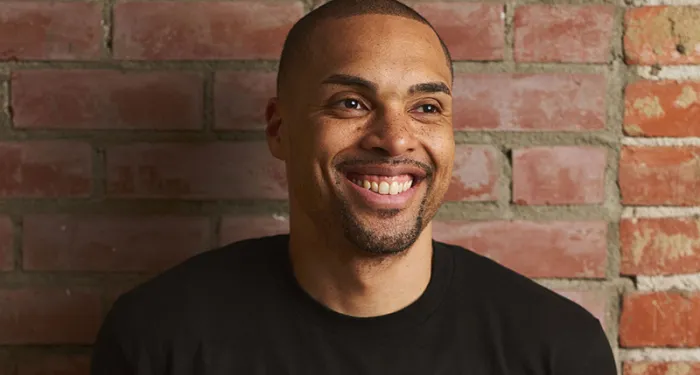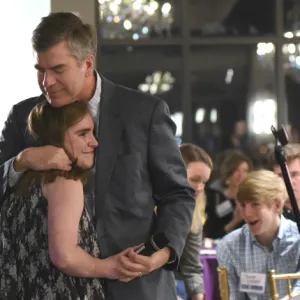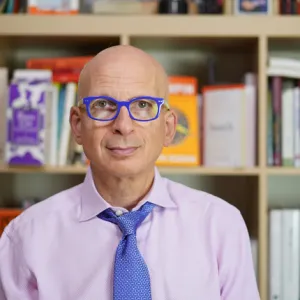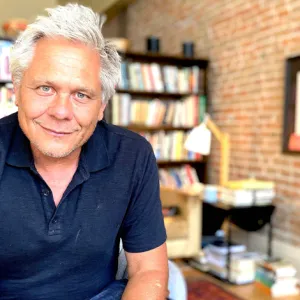
Tyrone Ross Jr.
Why Kids Need Money Education – And Who Is Bringing It
Fewer than half of states require financial literacy classes. Tyrone Ross Jr. is passionate about changing that, and expanding opportunities.
In this extended cut of the interview that first appeared at Fintech South, you will learn:
- Who is responsible for Tyrone's gratitude mindset
- Why failure is the best thing that will happen to you
- What the number 401 means to him, and how he's using itThe generous gift he received that said "I believe in you"
Now Tyrone is flipping financial management upside-down, from a business that takes to a business that gives. As a CEO, financial consultant, and cryptocurrency expert, he's one of the top wealth management influencers in the country pushing for opportunity and equality. His ideas have earned him recognition by Investment News, WealthManagement.com, FinancialPlanning.com, and Investopedia.
Most importantly for this podcast, Tyrone has a passion for giving back. Determined to break the mold of a traditional asset manager, he's launching an initiative called Learn to Money which focuses on providing financial education to children - especially those who are poor, rural, or minority - at no cost to schools. His goal is to provide a leg up to people like him, who struggled to speak the language of capitalism.
TYRONE ROSS JR: This is an honor to sit and have a conversation with you. I'm really looking forward to this. Thank you for having me.
FRANK BLAKE: Yeah, same here. Really looking forward to it. So let me start with just a general question about yourself. Where did you grow up? A little bit of your background, your childhood, how those experiences contributed to your current focus.
TYRONE ROSS JR: Yeah, I love this part of the story because it takes me to Atlanta. So I am a first-generation high school graduate, first in my family to graduate high school. Born and raised in New Jersey. My dad is from Guyana, South America. Met my mother, who was a teenage mother, had my sister is 17 years old. So when my mom and dad met, my mother had a six-month-old, and I came along six years later. Grew up in the Edison, New Jersey area, but moved around a lot. Don't really have a childhood home I can take you to or anything like that. And even with graduating high school, I graduated from the high school that I went to because we used my aunt's address.
So it was a very, it was a lot of love. There was a lot of good visuals and experiences in the home, but we didn't have much. And I think a lot of folks can relate to that. And one of the things that my mother had always impressed upon me was gratitude. We don't have much to give you, but when you leave the house, you can spend thank yous, right? So it was always about saying thank you, because she knew other people were going to have to feed us. She knew other people were going to have to clothe us. She knew other people were going to have to pour into us for us to get to this point. So she would always say, "You better say thank you. I'm going to check to see if you did."
FRANK BLAKE: Good for her.
TYRONE ROSS JR: Yeah. And so graduated high school, and I ran track in high school and was a highly recruited athlete. And I get a call from this Southern gentlemen named Grover Hinsdale, who was the head track and field coach at Georgia Tech Institute of Technology. And had never been to Atlanta, didn't know where Atlanta was, didn't know anything about it, but he sounded a lot like my high school coach. And I signed my letter of intent to go to the Georgia Institute of Technology to become a Ramblin' Wreck.
And as I got to Georgia Tech, I realized right away I was in over my head. So I got, I still I think hold the school record - I got kicked out twice. But the cool thing is now I have an endowment at Georgia Tech, which is pretty cool. So that begins a journey for me that is very nuanced and long, but again, it goes back to first-generation high school graduate is supposed to get kicked out of college. I didn't know anything about it, didn't know anyone that went.
But when I got there, I also was exposed to the South. I grew up in the North, and everything that was different there. I had red velvet cake for the first time, changed my life. So there are so many different, and again, Atlanta is core to who I am. And I probably visit Atlanta once or twice a year now, and Coach Hinsdale is like a father to me. If it wasn't for that experience at Georgia Tech, I wouldn't be where I am right now. So again, there's been a lot of up and downs. My life has been hard. I kind of got it going downhill now, but it's been this struggle.
But again, I call it being born with PHD, poor, hungry, and driven. So I was born with that, and that's one thing that I lean on. I'm never going to be the smartest. I didn't go to Wharton. I didn't go to Kellogg. I started on Wall Street at 26 years old. I didn't even know what a stock was. I had no idea. So that memory of seeing my dad struggle, not really being able to read and write, but man, being such a hard worker, my mother being so diligent and committed to raising a family that was always grateful, whether the lights were on or off, whether we had hot water, whether the car got repossessed, like it was, we're not going to complain. It could be worse, and we're going to be grateful. So there's a lot of nuance there, but that's a good core of who I am and where I come from.
FRANK BLAKE: So if you could, if you could go back and talk to your childhood self, what would you tell him?
TYRONE ROSS JR: Failure will be the best thing that ever happened to you.
FRANK BLAKE: Wow. All right. Explain. So your childhood self goes, "Well, I don't understand that." What do you tell him?
TYRONE ROSS JR: There will be very large situations in your life, and you will fail and you will fail repeatedly. Starting as a 17, 18 year old at university, I failed. I tried to make the Olympics three times. I failed. I tried to get into the financial industry, and they take the little personality exam, I failed that. And in my first time getting a license, I failed that. So failure has been this lesson of grit, determination, commitment, desire, will to get better. And even as a freshman in high school, I ended up, you know, I still have the school record at my school in the 400 hurdles. But my freshman and sophomore year, I fell twice at the state championships. Fell once at the ninth hurdle, the next year fell at the 10th hurdle. My junior year, I got it together and won, but it's literally like hurdles in life.
So one of the things that I realized is what I'm going to tell my children when I have them is what I don't want to do is I don't want to prepare the path for my kids. I want to prepare them for the path. And I think that's what my parents did for me. Everything they put in me allowed me to endure constantly being face-first with the concrete. But as many times as I fall, I get up more committed to fail again better. And I think I've been able to do that.
FRANK BLAKE: So this is a bit of a side note, but let me go off to the side for a second, because when you talk about failing at athletics, you reached a level of athletics that most every other person can never even dream of. I mean, you're actually seriously, you were in the Olympic trials. What did you learn from that intense, competitive, athletic side of you that's carried over on the financial side?
TYRONE ROSS JR: One is being in supreme health is an incredible advantage. I still train every day. I still train like I'm going to the Olympics. That'll never change, but that diligence … There's a book that's here off to my right. In that book, I have every workout I've ever done for the last 20 years. Every single day, haven't missed a day for 20 years. I have every workout, no matter where I am, no matter what I've done, 20 years, every day, haven't missed a day. So that type of commitment and diligence.
And again, I think there's a difference between work ethic and hard work. Hard work just means you're going to be tired. Work ethic means that there's processes that you put behind your hard work that are repeatable, that are scalable, that represents you at all times. So what I've learned from that journey is again, is there's a certain drive and commitment that goes into achieving anything great. But the ethics of being able to do it when nobody else wants to, meeting pleasure where other people meet pain, knowing that there is a way to sustain performance by food, sleep, repetition, those things, when you take those into business, it is such an advantage. Because people don't eat well. They like to party. They drink. They do all those things, where if I can go, if I have 10 pitch meetings, and in every meeting, I'm on fire, literally lit the first to the 10th, that's an advantage I'm never going to turn off. The desire to do one more, right?
I have a company that I started called 401, and that literally is from my high school coach. He was like, "Everyone to the meet today is coming to run 400. You're going to run 401." And I kind of took that with me in life. I'm going to do one more.
FRANK BLAKE: That's fantastic. That is fantastic. Talk for a second on the, so you start in finance, although, well, actually, one step back. Your degree is in communications. How do you go from there to finance? What's that bridge?
TYRONE ROSS JR: Well, what's funny is prior to literally walking on Wall Street, had never taken any type of business, accounting, economics, nothing. I avoided it like the plague. I didn't know anything about it. I didn't think it was for me. So I'm in graduate school, and a professor says, "You'd be great on Wall Street." And I'm like, "What street is that? What are you talking about?" And he literally had to educate me as to what Wall Street was. I had no idea. And he kind of walked me through the whole process of what it is, and stocks and bonds. I'm like, it was calculus to me at that point. I'm like, what is this?
So he helped me get my first job on Wall Street, doing investor relations and PR, which is mostly comm, right? It's communications with numbers. So it was kind of like that initial, the baby food before the ribeye, and I started to learn about the buy side and the sell side, and I had no idea of any of these things. So that's kind of how I started. And it became very much a lesson on … Now why I fight so hard for financial education in America, it was clear to me, these folks are speaking a language that I don't. I'm 26 years old. I've gone my whole life without speaking that language. How was it 90% of the things that they are saying doesn't resonate with me?
And I think that's what we've seen exacerbated in the country now. There's this chasm between the haves and the have-nots. What the haves have that the have-nots don't is they speak the language of a capitalist society, which is money. And the majority of people don't speak money. Money is a technology, but it's also a language. So I think that's what I realized. So once I was in a position now to affect change, which I am now, I go, hmm, all right, well, children could start picking up financial concepts at three. We're still doing the stupid stock-picking class as seniors in high school. 21 states require a financial education course to be taught. What am I missing?
So for me, there's this duality of when you're around so much wealth, and you come from nothing and you're in the middle of that and you go, all right, well, what's the common denominator here, and now it's me. So I'm trying to bridge those two worlds to provide more opportunity for folks that don't have it.
FRANK BLAKE: So talk a little bit about what, given that some of the background that prompted your efforts around financial education, talk a little bit about Learn to Money and what you're doing.
TYRONE ROSS JR: Yeah. So Learn to Money came to be in May of last year, again, if everyone remembers and I'm sure they do, last year felt like 10 years. But right around that time, our country was just in the midst of turmoil, of riots and looting. And you started to see all the companies start to make this commitment to address all of the issues that we knew were there, we didn't care. But all of a sudden, when it starts to hit our backyard, everyone's like, wait, how do we fix it?
And I tweeted, I said, "I'm seeing all this stuff about financial literacy now." Also, bad term, because financial literacy seems to be stigmatized, that it's only for those people, the plebes over there, financial literacy, but I've never heard anyone have an issue with education, right? Just marketing. Used car, certified pre-owned car.
So I started to use financial education. So I tweeted, I said, "Hey, why isn't there some small five, seven minute video that folks can watch that is really exciting, that's about money, that people want to watch repeatedly?" And I tweeted it. And I got an email 30 minutes later from a gentleman. He saw my tweet, and he goes, "Are you serious about this?" I'm like, "Yeah, I'm serious, but I don't want to consult the committee. I don't want anyone to tell me what to say or to curate the language. I just want to do it. How much would it cost? Let's figure it out."
And he got back to me, him and his partner got back to me. And a couple weeks later, we were shooting the trailer in North New Jersey. And we shot, I don't know, four hours of stuff, and we put it out and it went nuts. And the goal of Learn to Money was just simply me on camera, speaking about any topic, and you understand every word that is coming out of my mouth, nothing you have to Google or Investopedia or whatever. But the goal is to get it into schools. It should be in every school in America. And we put it out. We wanted to do another one, like a true pilot. And we wanted to raise some money to fund it, fund a full pilot episode. And we put it on GoFundMe, and literally two or three days, it was like 25 grand. And I think we raised up to $40,000. People just loved it.
And we shot the pilot, and we put the pilot out and that went even more nuclear. And again, so the goal is now we're trying to shoot 10 episodes, to get the full episodes out. And then what we want to do is give them away. We don't want to profit from these or whatever. It's literally, we need $500,000 to shoot 10 episodes, and we want to give it away. Any nonprofit, any school, any whatever, here's 10 episodes. It's paired with curriculum. It's me on camera. It's five to seven minutes. You'll love it. It's for kids. It's for adults. It's for whoever. And the goal is, again, to get it into every school in this country. And I am fully committed myself. I will travel to every single state, to every impoverished area in every single-
FRANK BLAKE: Be careful, Tyrone.
TYRONE ROSS JR: I absolutely will. And that's my commitment, because I think it's that important. No child in this country should not have access to a great financial education. They also should be fed, by the way. But every single child, regardless of their color or zip code, deserves a quality financial education. I wake up every morning dumb enough to believe I'm the one to do it, and I dare anybody to stop me.
FRANK BLAKE: That's awesome. The phrase Learn to Money is an interesting one, to have money as a verb there. What's your thought process behind that?
TYRONE ROSS JR: It was one, again, marketing to be catchy. But also literally learning what it means to money, like to bank, to invest, to earn, to grow. There's all of these different things, I always say, right, as an advisor, there's only four things you could ever do with money, make it, grow it, protect it, transfer it. That's it. There's nuance in there, but those are the only four things you could ever do with money. So those are the things that we want the youngsters to understand. We're going to teach you how to money. We're going to teach you how to speak it. We're going to teach you how to earn it, grow it, all of these different things. So it was just like a play on words that we thought was good, and it kind of resonated, but I think it really spoke to what the goal of the project was.
FRANK BLAKE: All right. So what's your vision of success look like? What does this look like when it's fully successful?
TYRONE ROSS JR: A couple things. One, we get the pilot, the full show, funded. That's one. Two, we get into every school district, state in the country. And at first, it could just be every state gets access to it and they show it. And then lastly, I'm sitting in front of Congress and saying, "Hey, why don't you guys require that every single state make financial education pre-K through 12 and then on from there?" So that's my personal goal, is three prong, where we'd like to see, but the goal is just to get them done and to get them out, because we want to give it away.
FRANK BLAKE: Well, you've got a good audience listening to you now on the first part, on the funding part. What difference do you think it would have made to you as a kid, growing up in New Jersey?
TYRONE ROSS JR: I mean, to watch my parents struggle, you know, they raised us in a home without a bank account for a while. I think for me, it would have just exposed me. Expose, educate, empower. Those are the big three. I did a Ted talk on this, expose, educate, and empower. That exposure is important. I would have been exposed to money in banking, as opposed to getting on Georgia Tech's campus and the first account I ever opened as an 18 year old is at a Wachovia. And I put the hundred dollars in, and I come back for the hundred dollars and the woman goes, "You don't have a hundred dollars." I'm like, "What do you mean?" She's like, "Oh, that was the fee. That was the coverage to open the account."
I said, "Wait a minute." I had no idea. That's all my parents, that's all they left me. So I didn't know anything. So I think it stops that embarrassment. It sets you up for success to be able to position yourselves. When I had a roommate and teammate that was watching these funny numbers go on the bottom of this screen, and I want to go chase girls, and he's still writing down his little numbers, and he ends up the treasurer of Disney. And then I end up kicked out of school. So those are the things where I think clearly his dad taught him the language of money. Mine didn't. That's where our lives diverged, so I think it would have helped me there.
FRANK BLAKE: So one of the things for this podcast that always interests me is you get somebody really successful like yourself, who takes the time to turn and help others. And look, honestly a lot of folks don't. Who did that for you? Who did a crazy good turn for you?
TYRONE ROSS JR: Man, there's so many different people that I can go through. Again, Coach Hinsdale at Georgia Tech, but I'll tell a really cool story really quickly. Marty Holler, my high school coach, he understood where we were as a family. And he would always see me come to, and again, track is a poor man's, woman's sport. All you need is a pair of shoes. I couldn't even get the shoes. So I kept coming to practice in these basketball shoes.
And he was a young coach at the time. And I've got really big feet. So it was tough for me to get track spikes. So after practice, late night, he drove me to Pennsylvania, we're in New Jersey, to get a pair of shoes, and he stayed there and he paid for the shoes and he bought me my first pair of track spikes. And I'll never forget it. Because at that point I realized how much he believed in me. And I want anybody that's ever around me, whether I'm in the elevator, sitting next to you on a plane, we standing in the grocery store, you should walk away going, "Man. He didn't even say anything to me, but he believes me. He believed in me."
So I just believe that there's so much more people that I'm responsible for helping them get out, because that's what was given to me. And I'm not sitting here talking to you, again, I'm still kind of in disbelief that I'm talking to you, but I don't get here unless he buys those shoes because he put belief in me that challenged me to get better. So I'll forever be grateful to him for that, and that is why I give on the level that I do.
FRANK BLAKE: All right, so what, for this audience that's listening, both to Crazy Good Turns, but also to Fintech South, and they've heard this and they've heard your passion and your gratitude and the way you express it to others, what should they be thinking about? What should they do after listening to this?
TYRONE ROSS JR: Start where your feet are. We are all in a situation where wherever we are, we can affect change right next to us. So I would tell people, one, it is a travesty that we go to bed every night and there are hungry children in this country. Nokidhungry.org, donate there. Feeding America, donate there. But we forget those that are in foster care, those that are in youth detention centers, those that are literally right where we are, the school system that you didn't want to send your kids to. Those kids deserve wifi. Those kids deserve lunch money. I was that kid on the line with no lunch money. Those kids deserve the same thing. So you don't necessarily have to send your kids to that school, but fund them, endow them, make sure those kids have wifi at school and at home.
So I just, I would encourage everyone, start where you are. Look around you. You can affect change right five meters from where your nose is. Look there, and pour all you can into that. And I think if we do that, we will be a better country overall and through. I think that the future of this country is bright, independent of party, class, color, creed, denomination. We will continue to be the best country in the world, but we will be because thoughtful giving has taken over and it's taken over with conversations like this. So I appreciate it.
FRANK BLAKE: Wow. You cannot find a better ending for this. Thank you so much, Tyrone. What a phenomenal effort you're taking on, and I hope you get a lot of support for it.
TYRONE ROSS JR: Absolutely.
FRANK BLAKE: Thank you.
TYRONE ROSS JR: No, thank you for the time. I appreciate you.
If you would like to help Tyrone launch this worthy project, I encourage you to donate here.
He grew up in a poor family that moved frequently and didn't use a bank or have a checking account. A first-generation high school graduate and burgeoning track star, he flunked out of college twice and failed to qualify at the U.S. Olympic track and field trials.
But Tyrone was born with what he calls "PHD - poor, hungry, and driven." Every time he stumbled and fell, he got up committed to fail better next time. Armed with that ambition, he earned a degree, pursued a career on Wall Street, and resolved to become financially literate.
Enter to Win a Scholarship to Write of Passage
To learn more about these scholarships, subscribe to our email newsletter. More details coming soon.




